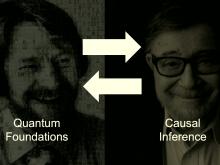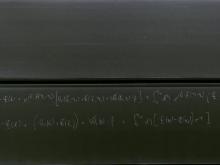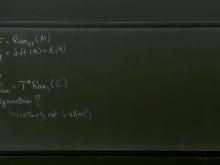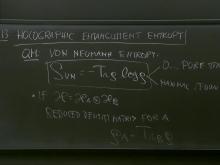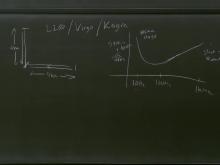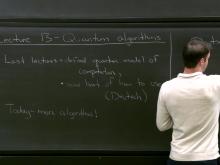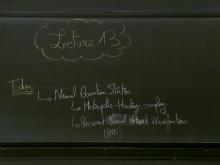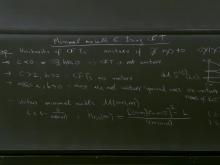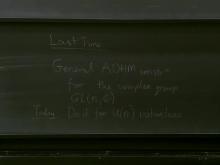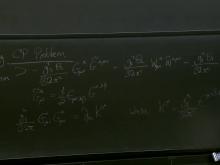Format results
-
4 talks-Collection NumberC25035
Talk
-
Causal Inference (Elective), PHYS 777, March 31 - May 2, 2025
13 talks-Collection NumberC25015Talk
-

Lecture - Causal Inference, PHYS 777
Robert Spekkens Perimeter Institute for Theoretical Physics
-

Lecture - Causal Inference, PHYS 777
Robert Spekkens Perimeter Institute for Theoretical Physics
-

Lecture - Causal Inference, PHYS 777
Robert Spekkens Perimeter Institute for Theoretical Physics
-

Lecture - Causal Inference, PHYS 777
Robert Spekkens Perimeter Institute for Theoretical Physics
-

Lecture - Causal Inference, PHYS 777
Robert Spekkens Perimeter Institute for Theoretical Physics
-

Lecture - Causal Inference, PHYS 777
Robert Spekkens Perimeter Institute for Theoretical Physics
-

Lecture - Causal Inference, PHYS 777
Robert Spekkens Perimeter Institute for Theoretical Physics
-

Lecture - Causal Inference, PHYS 777
Robert Spekkens Perimeter Institute for Theoretical Physics
-
-
Cosmology (Elective), PHYS 621, March 31 - May 2, 2025
13 talks-Collection NumberC25012Talk
-

Lecture - Cosmology, PHYS 621
Neal Dalal Perimeter Institute for Theoretical Physics
-

Lecture - Cosmology, PHYS 621
Neal Dalal Perimeter Institute for Theoretical Physics
-

Lecture - Cosmology, PHYS 621
Neal Dalal Perimeter Institute for Theoretical Physics
-

Lecture - Cosmology, PHYS 621
Neal Dalal Perimeter Institute for Theoretical Physics
-

Lecture - Cosmology, PHYS 621
Neal Dalal Perimeter Institute for Theoretical Physics
-

Lecture - Cosmology, PHYS 621
Neal Dalal Perimeter Institute for Theoretical Physics
-

Lecture - Cosmology, PHYS 621
Neal Dalal Perimeter Institute for Theoretical Physics
-

Lecture - Cosmology, PHYS 621
Neal Dalal Perimeter Institute for Theoretical Physics
-
-
Quantum Gravity (Elective), PHYS 644, February 24 - March 28, 2025
13 talks-Collection NumberC25014Talk
-

Lecture - Quantum Gravity, PHYS 644
Aldo Riello Perimeter Institute for Theoretical Physics
-

Lecture - Quantum Gravity, PHYS 644
Aldo Riello Perimeter Institute for Theoretical Physics
-

Lecture - Quantum Gravity, PHYS 644
Aldo Riello Perimeter Institute for Theoretical Physics
-

Lecture - Quantum Gravity, PHYS 644
Aldo Riello Perimeter Institute for Theoretical Physics
-

Lecture - Quantum Gravity, PHYS 644
Aldo Riello Perimeter Institute for Theoretical Physics
-

Lecture - Quantum Gravity, PHYS 644
Aldo Riello Perimeter Institute for Theoretical Physics
-

Lecture - Quantum Gravity, PHYS 644
Aldo Riello Perimeter Institute for Theoretical Physics
-

Lecture - Quantum Gravity, PHYS 644
Aldo Riello Perimeter Institute for Theoretical Physics
-
-
Quantum Matter (Elective), PHYS 777, March 31 - May 2, 2025
15 talks-Collection NumberC25011Talk
-

Lecture - Quantum Matter, PHYS 777
Chong Wang Perimeter Institute for Theoretical Physics
-

Lecture - Quantum Matter, PHYS 777
Chong Wang Perimeter Institute for Theoretical Physics
-

Lecture - Quantum Matter, PHYS 777
Chong Wang Perimeter Institute for Theoretical Physics
-

Lecture - Quantum Matter, PHYS 777
Chong Wang Perimeter Institute for Theoretical Physics
-

Lecture - Quantum Matter, PHYS 777
Chong Wang Perimeter Institute for Theoretical Physics
-

Lecture - Quantum Matter, PHYS 777
Chong Wang Perimeter Institute for Theoretical Physics
-

Lecture - Quantum Matter, PHYS 777
Chong Wang Perimeter Institute for Theoretical Physics
-

Lecture - Quantum Matter, PHYS 777
Chong Wang Perimeter Institute for Theoretical Physics
-
-
AdS/CFT (Elective), PHYS 777, March 31 - May 2, 2025
13 talks-Collection NumberC25013Talk
-

Lecture - AdS/CFT, PHYS 777
David Kubiznak Charles University
-

Lecture - AdS/CFT, PHYS 777
David Kubiznak Charles University
-

Lecture - AdS/CFT, PHYS 777
David Kubiznak Charles University
-

Lecture - AdS/CFT, PHYS 777
David Kubiznak Charles University
-

Lecture - AdS/CFT, PHYS 777
David Kubiznak Charles University
-

Lecture - AdS/CFT, PHYS 777
David Kubiznak Charles University
-

Lecture - AdS/CFT, PHYS 777
David Kubiznak Charles University
-

Lecture - AdS/CFT, PHYS 777
David Kubiznak Charles University
-
-
Strong Gravity (Elective), PHYS 777, February 24 - March 28, 2025
13 talks-Collection NumberC25009Talk
-

Lecture - Strong Gravity, PHYS 777
William East Perimeter Institute for Theoretical Physics
-

Lecture - Strong Gravity, PHYS 777
William East Perimeter Institute for Theoretical Physics
-

Lecture - Strong Gravity, PHYS 777
William East Perimeter Institute for Theoretical Physics
-

Lecture - Strong Gravity, PHYS 777
William East Perimeter Institute for Theoretical Physics
-

Lecture - Strong Gravity, PHYS 777
William East Perimeter Institute for Theoretical Physics
-

Lecture - Strong Gravity, PHYS 777
William East Perimeter Institute for Theoretical Physics
-

Lecture - Strong Gravity, PHYS 777
William East Perimeter Institute for Theoretical Physics
-

Lecture - Strong Gravity, PHYS 777
William East Perimeter Institute for Theoretical Physics
-
-
Quantum Information (Elective), PHYS 635, February 24 - March 28, 2025
13 talks-Collection NumberC25006Talk
-

-

Lecture - Quantum Information, PHYS 635
Alex May Perimeter Institute for Theoretical Physics
-

Lecture - Quantum Information, PHYS 635
Alex May Perimeter Institute for Theoretical Physics
-

Lecture - Quantum Information, PHYS 635
Alex May Perimeter Institute for Theoretical Physics
-

Lecture - Quantum Information, PHYS 635
Alex May Perimeter Institute for Theoretical Physics
-

Lecture - Quantum Information, PHYS 635
Alex May Perimeter Institute for Theoretical Physics
-

Lecture - Quantum Information, PHYS 635
Alex May Perimeter Institute for Theoretical Physics
-

Lecture - Quantum Information, PHYS 635
Alex May Perimeter Institute for Theoretical Physics
-
-
Machine Learning (Elective), PHYS 777, February 24 - March 28, 2025
11 talks-Collection NumberC25008Talk
-

Lecture - Machine Learning, PHYS 777
Mohamed Hibat Allah University of Waterloo
-

Lecture - Machine Learning, PHYS 777
Mohamed Hibat Allah University of Waterloo
-

Lecture - Machine Learning, PHYS 777
Mohamed Hibat Allah University of Waterloo
-

Lecture - Machine Learning, PHYS 777
Mohamed Hibat Allah University of Waterloo
-

Lecture - Machine Learning, PHYS 777
Mohamed Hibat Allah University of Waterloo
-

Lecture - Machine Learning, PHYS 777
Mohamed Hibat Allah University of Waterloo
-

Lecture - Machine Learning, PHYS 777
Mohamed Hibat Allah University of Waterloo
-

Lecture - Machine Learning, PHYS 777
Mohamed Hibat Allah University of Waterloo
-
-
Quantum Field Theory III, PHYS 777-, February 24 - March 28, 2025
13 talks-Collection NumberC25005Talk
-

Lecture - Quantum Field Theory III - PHYS 777
Jaume Gomis Perimeter Institute for Theoretical Physics
-

Lecture - Quantum Field Theory III - PHYS 777
Jaume Gomis Perimeter Institute for Theoretical Physics
-

Lecture - Quantum Field Theory III - PHYS 777
Jaume Gomis Perimeter Institute for Theoretical Physics
-

Lecture - Quantum Field Theory III - PHYS 777
Jaume Gomis Perimeter Institute for Theoretical Physics
-

Lecture - Quantum Field Theory III - PHYS 777
Jaume Gomis Perimeter Institute for Theoretical Physics
-

Lecture - Quantum Field Theory III - PHYS 777
Mykola Semenyakin Perimeter Institute for Theoretical Physics
-

Lecture - Quantum Field Theory III - PHYS 777
Mykola Semenyakin Perimeter Institute for Theoretical Physics
-

Lecture - Quantum Field Theory III - PHYS 777 (extra Lecture)
Mykola Semenyakin Perimeter Institute for Theoretical Physics
-
-
Mathematical Physics (Elective), PHYS 777, March 31 - May 2, 2025
13 talks-Collection NumberC25007Talk
-

Lecture - Mathematical Physics, PHYS 777
Kevin Costello Perimeter Institute for Theoretical Physics
-

Lecture - Mathematical Physics, PHYS 777
Mykola Semenyakin Perimeter Institute for Theoretical Physics
-

Lecture - Mathematical Physics, PHYS 777
Kevin Costello Perimeter Institute for Theoretical Physics
-

Lecture - Mathematical Physics, PHYS 777
Kevin Costello Perimeter Institute for Theoretical Physics
-

Lecture - Mathematical Physics, PHYS 777
Kevin Costello Perimeter Institute for Theoretical Physics
-

Lecture - Mathematical Physics, PHYS 777
Kevin Costello Perimeter Institute for Theoretical Physics
-

Lecture - Mathematical Physics, PHYS 777
Kevin Costello Perimeter Institute for Theoretical Physics
-

Lecture - Mathematical Physics, PHYS 777
Kevin Costello Perimeter Institute for Theoretical Physics
-
-
Standard Model (Elective), PHYS 622, January 6 - February 5, 2025
13 talks-Collection NumberC25003Talk
-
Energy Operators in Particle Physics, QFT, and Gravity - June 6-13, 2025
4 talks-Collection NumberC25035Detector operators, of which the average null energy operator provides the most famous example, arise as direct theoretical models of asymptotic measurements in collider experiments. In QFT, detector operators are expressed in terms of "light-ray operators", whose correlation functions provide an interesting class of non-perturbatively well-defined observables. There has recently been renewed interest in detector operators coming from three distinct directions: In CFTs, there has been progress understanding the space of light-ray operators, their organization into Regge trajectories, and their appearance in Lorentzian operator product expansions. In perturbative QFT and gravity, borrowing techniques from the study of scattering amplitudes, there has been progress understanding multi-point correlation functions of detector operators, in particular, their function space and singularities. Finally, in particle physics, there have recently been direct measurements of correlation functions of detector operators in collider experiments, enabling measurements of their scaling behavior and the structure of multi-point correlators of light-ray operators in QCD. In this mini-course I will give an introduction to the theory of light-ray/ detector operators, their correlators, and their applications in particle phenomenology, and provide an overview of the recent progress in the directions mentioned above. Throughout, I will attempt to highlight the different perspectives and motivations for studying these operators, coming from the CFT, amplitudes and phenomenological communities. I will conclude with a discussion of open problems in both theory and phenomenological applications, as well as highlighting areas where theoretical developments could have an impact on real world applications at colliders. Join live sessions via Zoom link: https://pitp.zoom.us/j/96935592330?pwd=NNtf7839TThLFEWIzdH7fYxNYksyYr.1 View all past talks on PIRSA: https://pirsa.org/c25035 -
Causal Inference (Elective), PHYS 777, March 31 - May 2, 2025
13 talks-Collection NumberC25015Can the effectiveness of a medical treatment be determined without the expense of a randomized controlled trial? Can the impact of a new policy be disentangled from other factors that happen to vary at the same time? Questions such as these are the purview of the field of causal inference, a general-purpose science of cause and effect, applicable in domains ranging from epidemiology to economics. Researchers in this field seek in particular to find techniques for extracting causal conclusions from statistical data. Meanwhile, one of the most significant results in the foundations of quantum theory—Bell’s theorem—can also be understood as an attempt to disentangle correlation and causation. Recently, it has been recognized that Bell’s result is an early foray into the field of causal inference and that the insights derived from almost 60 years of research on his theorem can supplement and improve upon state-of-the-art causal inference techniques. In the other direction, the conceptual framework developed by causal inference researchers provides a fruitful new perspective on what could possibly count as a satisfactory causal explanation of the quantum correlations observed in Bell experiments. Efforts to elaborate upon these connections have led to an exciting flow of techniques and insights across the disciplinary divide. This course will explore what is happening at the intersection of these two fields. Instructor: Robert Spekkens/Bindiya Arora Students who are not part of the PSI MSc program should review enrollment and course format information here: https://perimeterinstitute.ca/graduate-courses -
Cosmology (Elective), PHYS 621, March 31 - May 2, 2025
13 talks-Collection NumberC25012This course in Cosmology provides a theoretical overview of the standard cosmological model. Key topics include the FRW metric and the homogeneous universe, the thermal history of the universe (with an emphasis on the hot Big Bang and equilibrium thermodynamics), inflation and scalar field dynamics, along with selected aspects of cosmological perturbation theory (time permitting). Instructor: Neal Dalal/Ghazal Geshnizjani Students who are not part of the PSI MSc program should review enrollment and course format information here: https://perimeterinstitute.ca/graduate-courses -
Quantum Gravity (Elective), PHYS 644, February 24 - March 28, 2025
13 talks-Collection NumberC25014The main goal of this course is to show in which ways General Relativity (GR) is similar, and especially in which ways it is different, from other gauge theories. The largest component of the course is dedicated to studying the specific symmetry structure of GR and how it intimately relates to its dynamics. To do so, we will introduce a host of concepts and techniques, broadly (and loosely) known under the name of “Covariant Phase Space Method”. This provides a different perspective on GR’s physics, a perspective in which phase space, rather than spacetime, is front and center. Along the way we will take a few detours: we will explore (parts of) the historical debate on whether gravity should be quantized at all, discuss how to think of time evolution when there is no absolute time, and go through Wald’s proposal of black hole entropy as a Noether charge. The intended outcome of the course is to provide a new perspective on GR which, hopefully, will inform you on why it is much harder to quantize than other theories – especially from a non-perturbative perspective. In this sense the course always keeps an eye on Quantum Gravity, even though there will be very little “quantum” in it. It is also a course that does not hinge on any specific approach to the quantization of gravity. Also, it is worth noting that the covariant phase space techniques are broadly used in the current literature on the black hole information paradox, soft symmetries, and holography, and is therefore a useful tool to learn if you are interested in any of these topics. Instructor: Aldo Riello Students who are not part of the PSI MSc program should review enrollment and course format information here: https://perimeterinstitute.ca/graduate-courses -
Quantum Matter (Elective), PHYS 777, March 31 - May 2, 2025
15 talks-Collection NumberC25011This course will cover quantum phases of matter, with a focus on long-range entangled states, topological states, and quantum criticality. Instructor: Chong Wang/Subhayan Sahu Students who are not part of the PSI MSc program should review enrollment and course format information here: https://perimeterinstitute.ca/graduate-courses -
AdS/CFT (Elective), PHYS 777, March 31 - May 2, 2025
13 talks-Collection NumberC25013We will cover the basics of the gauge/gravity duality, including some of the following aspects: holographic fluids, applications to condensed matter systems, entanglement entropy, and recent advances in understanding the black hole information paradox. Instructor: David Kubiznak/Gang Xu Students who are not part of the PSI MSc program should review enrollment and course format information here: https://perimeterinstitute.ca/graduate-courses -
Strong Gravity (Elective), PHYS 777, February 24 - March 28, 2025
13 talks-Collection NumberC25009This course will introduce some advanced topics in general relativity related to describing gravity in the strong field and dynamical regime. Topics covered include properties of spinning black holes, black hole thermodynamics and energy extraction, how to define horizons in a dynamical setting, formulations of the Einstein equations as constraint and evolution equations, and gravitational waves and how they are sourced. Instructor: William East/Ghazal Geshnizjani Students who are not part of the PSI MSc program should review enrollment and course format information here: https://perimeterinstitute.ca/graduate-courses -
Quantum Information (Elective), PHYS 635, February 24 - March 28, 2025
13 talks-Collection NumberC25006We look to understand the possibilities and limits of quantum information processing, and how an information theory perspective can inform theoretical physics. Topics covered include: entanglement, tools for measuring nearness of quantum states, characterizing the most general possible quantum operations, entropy and measuring information, the stabilizer formalism, quantum error-correcting codes, the theory of computation, quantum algorithms, classical and quantum complexity. Instructor: Alex May/Bindiya Arora Students who are not part of the PSI MSc program should review enrollment and course format information here: https://perimeterinstitute.ca/graduate-courses -
Machine Learning (Elective), PHYS 777, February 24 - March 28, 2025
11 talks-Collection NumberC25008Machine learning has become a very valuable toolbox for scientists including physicists. In this course, we will learn the basics of machine learning with an emphasis on applications for many-body physics. At the end of this course, you will be equipped with the necessary and preliminary tools for starting your own machine learning projects. Instructor: Mohamed Hibat Allah Students who are not part of the PSI MSc program should review enrollment and course format information here: https://perimeterinstitute.ca/graduate-courses -
Quantum Field Theory III, PHYS 777-, February 24 - March 28, 2025
13 talks-Collection NumberC25005The course will cover the basics of conformal field theories and also some applications, including exact computations of the critical exponents in 2d statistical models. Instructor: Jaume Gomis/Mykola Semenyakin Students who are not part of the PSI MSc program should review enrollment and course format information here: https://perimeterinstitute.ca/graduate-courses -
Mathematical Physics (Elective), PHYS 777, March 31 - May 2, 2025
13 talks-Collection NumberC25007We will discuss mathematical aspects of classical and quantum field theory, including topics such as: symplectic manifolds and the phase space, symplectic reduction, geometric quantization, Chern-Simons theory, and others. Instructor: Kevin Costello/Mykola Semenyakin Students who are not part of the PSI MSc program should review enrollment and course format information here: https://perimeterinstitute.ca/graduate-courses -
Standard Model (Elective), PHYS 622, January 6 - February 5, 2025
13 talks-Collection NumberC25003The Standard Model of particle physics is introduced, and reviewed, from a modern effective field theory perspective. Instructor: Seyda Ipek/Gang Xu Students who are not part of the PSI MSc program should review enrollment and course format information here: https://perimeterinstitute.ca/graduate-courses



